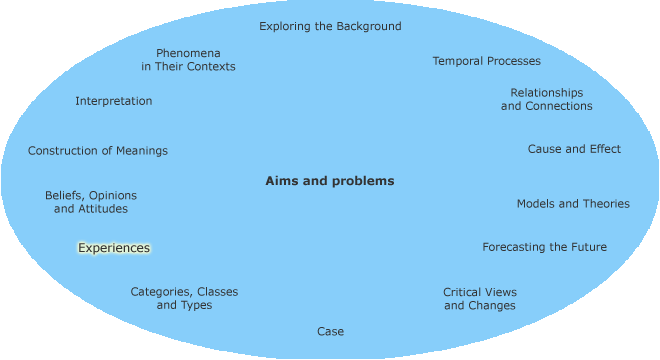Experiences

In humanistic research, the interest may focus on human experience of a phenomenon, such as a work of art, space or social situation. The research may focus on either your experience or the experiences of other people; the two forms have different starting points. The aim of the research is to describe the experiences, categorize them, and analyze the knowledge produced by the experiences. Research focusing on the reception of works of art, texts or other phenomena is a reception study. The research of reception may also focus on the experiences formed in the reception process.
Strategies
Research aiming to identify and understand concrete phenomenon on the basis of experiences and knowledge got through experiences is empirical research. The aim of the research may be based on other people´s experiences or an analysis of the knowledge of other people on the researched phenomenon. Qualitative research is the norm.
You can also use other research strategies, for example:
A case study enables you to research experiences of a particular or small group of research objects.
Phenomenological research enables you to do research of experiences and the use of knowledge formed through experiences.
Data Collection
When your research focuses on experiences, you should use self-collected data from self-produced materials. You should define the data so that the research can be a population study.
In phenomenological research, you typically collect the data through observation, participation and field work. You can collect the experiences (data) of other people through interviews, questionnaires or narratives. You can also gain knowledge about other people´s experiences on some phenomena through experiments.
Data Analysis
Qualitative analysis methods are suitable for research of experiences. There exist in different disciplines and research orientations various ways of understanding analysis which focuses on experience or which uses experiences in the production of knowledge. Phenomenological analysis enables you to explore either your own experiences or the experiences and thoughts of other people.
Philosphy in Science
Qualitative analysis methods in the humanities are based on interpretivism. Views emphasising interpretation in the formation of meanings and subjectivity in meaning-making processes, obey the idea of relativism. Phenomenology is the basis of phenomenological analysis and phenomenographical analysis.
